|
|
|
Sort Order |
|
|
|
Items / Page
|
|
|
|
|
|
|
| Srl | Item |
| 1 |
ID:
160733
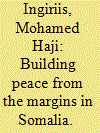

|
|
|
|
|
| Summary/Abstract |
The prevailing discourse in Mogadishu among the federal government of Somalia and the international community is that Al-Shabaab is no longer relevant in contemporary Somali political landscape. In the language of the government, Al-Shabaab is like a lost crocodile thrown out from the river. In the lexicon of the international community, Al-Shabaab is gradually receding. In fact, Al-Shabaab is actually puissant and potent in terms of social, political and military capabilities; not just in Somalia, but also in the wider East Africa region. Why is Al-Shabaab resilient and resistant? Why is it even more effective than the federal government? To answer these questions, this article reveals how Al-Shabaab is increasingly more legitimate than the federal government. In conclusion, the article proposes that negotiated settlement with the insurgency movement could lead to peace in war-torn southern Somalia.
|
|
|
|
|
|
|
|
|
|
|
|
|
|
|
|
| 2 |
ID:
160735
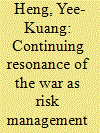

|
|
|
|
|
| Summary/Abstract |
In the late 1990s and 2000s, a slew of books and journal articles proposed that a nexus between risk management and warfare was emerging. This article argues that risk management ideas continue to shape recent campaigns against Libya, Islamic State, Syria, and the war on terror from Niger, Yemen to Somalia. It uses existing literature on risk and warfare to examine four key aspects of contemporary interventions. First, the article evaluates the overall strategic context as security concerns shift from terrorism toward renewed great power competition. Second, it re-assesses the risk calculus for military action through the language and grammar of risk invoked by politicians. Third and fourth, it addresses the continuing reliance on air power and the managerial ethos of military operations as important features of war as risk management.
|
|
|
|
|
|
|
|
|
|
|
|
|
|
|
|
| 3 |
ID:
160734
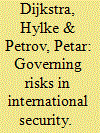

|
|
|
|
|
| Summary/Abstract |
Risks are omnipresent in contemporary international security. Despite a long tradition in security studies going at least back to Von Clausewitz, we consider that the topic of risk remains under-examined. This forum seeks to advance the research agenda on risk in security studies by showcasing work of scholars using advanced concepts of risk, based on insights from sociology, biology, psychology, and safety studies, to better understand the role of risk in international security. As a way of introduction, this short article sets out the main debates.
|
|
|
|
|
|
|
|
|
|
|
|
|
|
|
|
| 4 |
ID:
160737


|
|
|
|
|
| Summary/Abstract |
How much mileage can we get out of prospect theory to explain foreign policy decision-making? To answer this question, we first argue that risk as outcome uncertainty is the appropriate definition in prospect-theoretical applications. Then, we indicate that probability weighting—a crucial component of prospect theory—is typically ignored in such applications. We argue why this is problematic and suggest how to move forward. Next, we discuss how to establish the reference point in the face of outcomes in multiple dimensions, as is typically the case in foreign policy decision-making. Finally, we discuss what we have learnt regarding prospect theory’s scope conditions and the differences across individuals in the theory’s applicability. Overall, our contribution lies in identifying several underexposed or neglected issues (e.g., the definition of risk and probability weighting), in examining the advancements regarding prospect theory’s scope conditions, and in discussing avenues for further research.
|
|
|
|
|
|
|
|
|
|
|
|
|
|
|
|
| 5 |
ID:
160736
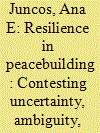

|
|
|
|
|
| Summary/Abstract |
With the failure of liberal peace strategies in the Global South, resilience has recently become the risk management strategy par excellence in peacebuilding. Since it is not possible to predict when the next crisis will take place, peacebuilders must invest in bottom-up adaptive capacities to cope with external shocks. This article moves away from governmentality accounts of resilience which are overtly deterministic and depoliticizing. Instead, it posits that the uncertainty, ambiguity, and complexity associated with resilience mean that we should expect opportunities for contestation and institutional agency. This argument will be illustrated by drawing upon the European Union’s adoption of the resilience approach in its peacebuilding and security policies. The article argues that while uncertainty, ambiguity, and complexity constitute the ontological conditions that underpin the rise of resilience in peacebuilding, they are also likely to lead to its potential demise.
|
|
|
|
|
|
|
|
|
|
|
|
|
|
|
|
| 6 |
ID:
160738
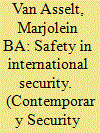

|
|
|
|
|
| Summary/Abstract |
While security points to a deliberate harming of humans and/or the environment, safety refers to unintended damage. In this view point, I will analyse how the distinction between safety and security matters in the practice of accident investigation and I will argue that the division between the fields is problematic for the assessment of security-related safety risks. Drawing on the case of the our accident investigation into the downing of flight MH17 above Ukraine in 2014, I highlight key dilemmas the Dutch Safety Board dealt with.
|
|
|
|
|
|
|
|
|
|
|
|
|
|
|
|
| 7 |
ID:
160732
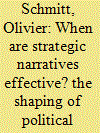

|
|
|
|
|
| Summary/Abstract |
Most research on strategic narratives has explored their creation, and their interaction with other elements of national power in the conduct of foreign policy. Yet, the issue of how the targeted political communities receive those strategic narratives, and thus how those narratives are likely to have a political impact, is understudied. This article argues that in order to understand the ways strategic narrative are received within a political community, political myths must be taken into account. It introduces a typology of political myths based on their degree of universality and their degree of coherence with other myths, and shows how those factors influence the reception of strategic narratives. These mechanisms are illustrated through a study of the reception of the Russian strategic narrative in France. This approach offers opportunities to assess the differentiated impact strategic narratives have on political communities.
|
|
|
|
|
|
|
|
|
|
|
|
|
|
|
|
|
|
|
|
|